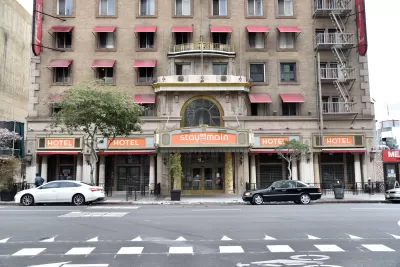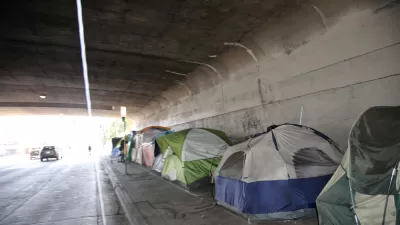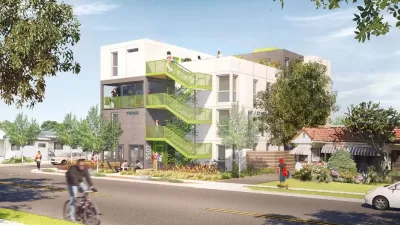The city returned nearly $150 million in federal funding directed to providing shelter and supportive services to the Department of Housing and Urban Development.

Los Angeles housing agencies returned close to $150 million in federal funding aimed at alleviating homelessness over six years, even as the city saw a massive increase in the number of unhoused people living on its streets, writes Connor Sheets in the Los Angeles Times.
According to the article, “[The Los Angeles Homeless Services Authority] returned more than $29 million to HUD during the six-year period; the Housing Authority of the City of Los Angeles returned more than $82 million; and the Los Angeles County Development Authority returned nearly $38 million.”
The article explains some of the logistical difficulties faced by organizations trying to build supportive housing projects and the residents who want to access housing and services. A LAHSA spokesperson explained, “in a climate where the rental market is so hard to access, it makes it very challenging to use all these resources,” blaming HUD’s “rigid” funding system and calling for more flexibility. The local housing authorities also cited “insufficient workable housing units,” landlords’ refusal to rent to unhoused people, and “shortfalls” by program partners.
“But affordable-housing developers decry the return of any funds, blaming red tape and government inefficiency for their underuse. Many say they could immediately use some of that money to house Angelenos in desperate need of assistance.” Read the source article for more details on the returned funds and how advocates say the city and county could more effectively allocate federal dollars to local projects.
Related on Planetizen:
FULL STORY: Los Angeles agencies returned $150 million in federal funds to house homeless people

Planetizen Federal Action Tracker
A weekly monitor of how Trump’s orders and actions are impacting planners and planning in America.

San Francisco's School District Spent $105M To Build Affordable Housing for Teachers — And That's Just the Beginning
SFUSD joins a growing list of school districts using their land holdings to address housing affordability challenges faced by their own employees.

The Tiny, Adorable $7,000 Car Turning Japan Onto EVs
The single seat Mibot charges from a regular plug as quickly as an iPad, and is about half the price of an average EV.

Seattle's Plan for Adopting Driverless Cars
Equity, safety, accessibility and affordability are front of mind as the city prepares for robotaxis and other autonomous vehicles.

As Trump Phases Out FEMA, Is It Time to Flee the Floodplains?
With less federal funding available for disaster relief efforts, the need to relocate at-risk communities is more urgent than ever.

With Protected Lanes, 460% More People Commute by Bike
For those needing more ammo, more data proving what we already knew is here.
Urban Design for Planners 1: Software Tools
This six-course series explores essential urban design concepts using open source software and equips planners with the tools they need to participate fully in the urban design process.
Planning for Universal Design
Learn the tools for implementing Universal Design in planning regulations.
Smith Gee Studio
City of Charlotte
City of Camden Redevelopment Agency
City of Astoria
Transportation Research & Education Center (TREC) at Portland State University
US High Speed Rail Association
City of Camden Redevelopment Agency
Municipality of Princeton (NJ)





























